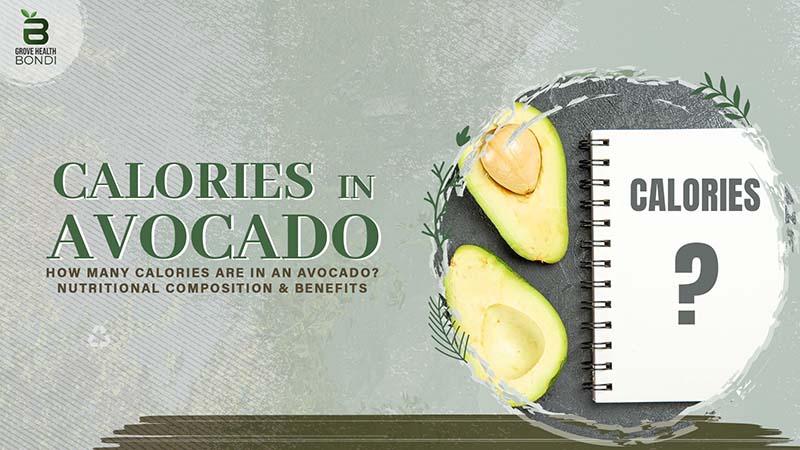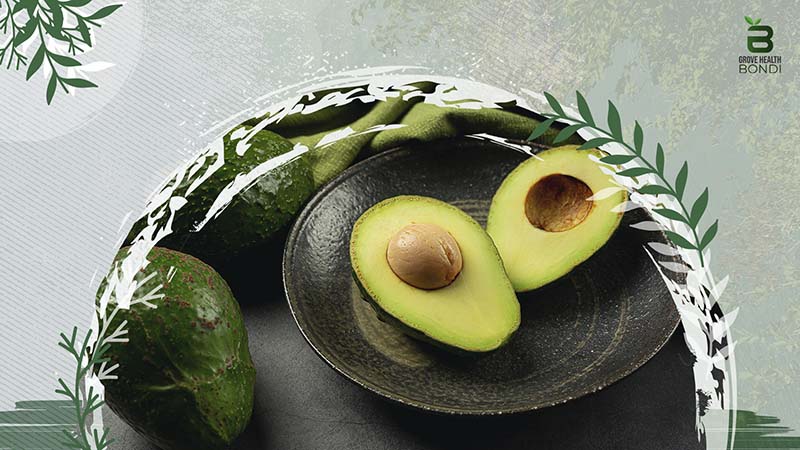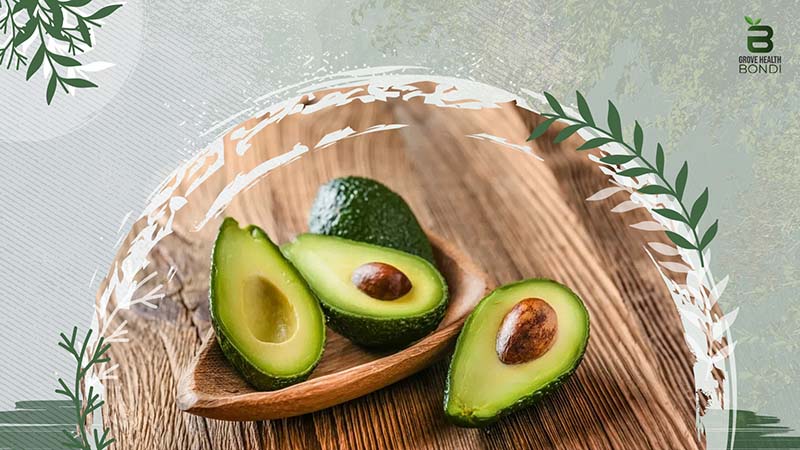Avocados are renowned as a rich source of fiber and monounsaturated fats, making them a great choice for those pursuing a healthy diet and aiming to control their weight. If you’re seeking a food option that is both delicious and aids in weight loss, avocados are an option you can’t overlook. But the question arises, “how many calories in an avocado?” and how can it be effectively integrated into your diet? Let’s explore the secrets of eating avocados for weight loss with Grove Health Bondi in the following article.

1. Caloric Content of an Avocado
Avocados are a good source of calories, with the amount of calories varying based on the size of each fruit. An average avocado, weighing about 200 grams, can provide approximately 320 calories to the body. However, this calorie count is not fixed and can vary from 200 to 360 calories depending on the type of avocado, its ripeness, and how you measure it. Specifically:
- If you eat half an avocado, equivalent to about 100 grams, you will intake approximately 160 calories.
- When you take 100 grams of the flesh of the avocado (excluding the skin and seed), you will also receive about 160 calories.
- In the case where you only use a tablespoon of mashed avocado, about 15 grams, the amount of calories you receive will be around 35 calories.

2. Nutritional Composition of an Avocado
Avocados are recognized as a nutrient-rich food source, according to the United States Department of Agriculture (USDA). Each avocado provides a significant amount of essential nutrients to the body:
- Protein: Each avocado contains about 1 gram of protein, which helps build and repair body tissues.
- Fiber: With 3.3 grams of fiber, avocados support the digestive system and may help control blood sugar levels.
- Fats: Avocados contain 7.3 grams of fats, of which 1 gram is saturated fat and 5.8 grams are unsaturated fats, these fats are very beneficial for cardiovascular health.
- Carbohydrates: Each avocado provides about 4.3 grams of carbohydrates, necessary for energy provision.
- Sodium: With only 3.5 milligrams of sodium, avocados are a good choice for those reducing their salt intake.
- Folate: Avocados provide 10% of the daily value (DV) of folate, a type of B vitamin necessary for cell development and DNA production.
- Copper: Providing 11% DV, copper is a mineral necessary for the formation of collagen and iron absorption.
- Pantothenic Acid (Vitamin B5): With 14% DV, pantothenic acid helps convert food into energy and produce hormones. The daily value (DV) is an index that helps you evaluate the amount of essential nutrients that the body needs daily based on a 2000 calorie diet.

3. Health Benefits of Avocados
Avocados are not only an excellent food for weight loss, but they also have numerous other fantastic health benefits. For instance, they help boost the body’s metabolism, control symptoms of diabetes, and even have the potential to prevent various types of cancer.

3.1. Stabilizing Blood Sugar Levels
Avocados are an excellent food choice for people with diabetes due to their low carbohydrate content and nearly negligible glycemic index (GI). This makes avocados a part of a diet that effectively controls blood sugar levels.
Furthermore, avocados are rich in monounsaturated fats (MUFAs), a type of healthy fat beneficial for improving metabolic function, especially in people with type 2 diabetes. Therefore, incorporating avocados into your daily diet is encouraged to enhance meal quality and support diabetes management.
3.2. Enhancing Gut Health
Avocados are an excellent source of natural fiber, with about 25% being soluble fiber. This fiber enhances beneficial gut bacteria, helps prevent constipation, and reduces the risk of inflammation and colorectal cancer.
Moreover, some studies have indicated that regular consumption of avocados can help reduce bile acid levels in feces, a factor that can cause gut issues such as inflammation and colon cancer. Therefore, incorporating avocados into your daily diet not only improves gut health but also helps prevent related diseases.

3.3. Rich in Antioxidants
Avocados are a rich source of antioxidants such as carotenoids, vitamin C, E, and phenolic compounds. These substances have the ability to protect the body against harmful free radicals, thereby helping to reduce the risk of developing chronic diseases. Regular consumption of avocados can support the body in maintaining long-term health and preventing diseases.
3.4. Prevention of Certain Cancers
Avocados are packed with phytochemicals and carotenoids, substances known for their ability to combat cancer cells. Additionally, the folate present in avocados plays a crucial role in preventing common types of cancer such as pancreatic, stomach, and colon cancer.

3.5. Reducing Metabolic Syndrome Risk
People facing metabolic syndrome often exhibit symptoms such as a large waistline and issues with blood sugar, high blood pressure, as well as an unbalanced diet. To prevent these problems, adding avocados to your daily diet can be a beneficial measure. According to research from NHANES, a health and nutrition survey program, avocado consumption has been linked to a reduced risk of developing metabolic syndrome.
3.6. Effective for Weight Loss
Avocados, with their rich and delicious flavor, help curb cravings and create a lasting feeling of fullness, which is very beneficial for those trying to lose weight. In fact, eating avocados not only doesn’t make you gain weight but can also support the weight loss process.
The long-lasting feeling of fullness when eating avocados is due to their high fiber content. Moreover, some studies have shown that people who regularly eat avocados typically have a lower Body Mass Index (BMI) and a smaller waistline compared to those who don’t eat avocados.

4. Does Eating Avocado Lead to Weight Gain? [Expert answers]
Avocados are a bountiful source of energy, with high calorie and fat content. A serving of avocado, about 150g, can contain up to 250 calories. However, whether avocados contribute to weight gain depends on the amount consumed and how it’s incorporated into your diet.
If you consume avocados in moderation and balance it with other foods, avocados will not lead to weight gain. Conversely, overeating avocados or combining them with sugar and condensed milk could result in weight gain.
Avocados also contain a wealth of fiber, vitamins, and essential minerals such as vitamins A, B, C, potassium, iron, copper, and calcium. For those looking to gain weight, avocados can be a part of a healthy diet to safely achieve weight goals.
However, it’s important to note that one should not consume too many avocados, especially in the evening, as the high plant fat content in avocados can affect weight and health if not controlled.

5. Guide to Eating Avocado for Effective Weight Loss
To utilize avocados as part of a weight loss diet, you need to apply specific methods. Here are three common approaches:
- Divide the avocado throughout the day: Don’t consume a large amount of avocado in one meal. Instead, divide it into three main meals: breakfast, lunch, and dinner. The amount of avocado you should eat depends on your goals and calorie needs. If your goal is to lose weight, limit yourself to 1 – 2 avocados per day, equivalent to about 300 calories.
- Use avocado as a substitute for other fat sources: You can use avocado as a substitute for vegetable butter in grilled dishes. This helps reduce the amount of cholesterol and saturated fats you consume. If you decide to completely replace vegetable butter with avocado in your cooking recipe, reduce the oven temperature by 4°C compared to the original level.
- Combine avocado with salad: Avocado is a great ingredient to add to salads. Just choose your favorite vegetables, add ½ or 110 grams of sliced avocado. This salad is not only a great appetizer but also very good for health.

6. Who Should Limit or Avoid Avocado Consumption?
Certain people need to exercise caution when consuming avocados:
- Those prone to allergic reactions: They should limit their intake of avocados and avocado-containing products in their diet, as it can cause allergic symptoms such as rashes, itching, swollen lips, dermatitis, stomach pain, nausea, shortness of breath, and in severe cases, anaphylactic shock.
- Those with liver issues: Since avocados contain a significant amount of fat, individuals with liver problems should limit their consumption of this fruit.
- Those on medication: The nutrients in avocados can interact with certain medications, so individuals on medication need to be cautious when eating avocados.
- Breastfeeding women: Eating too many avocados can reduce milk production and even cause damage to the mammary glands.
- Those with illnesses, especially those related to the digestive system.
- Those who are overweight or are following a diet regimen to lose weight.
7. Conclusion
We hope that the information in this article has helped you better understand the question, “how many calories in an avocado?” and how to use it to support your weight loss journey. Remember to share this knowledge with your friends and family so that everyone can benefit from the wonderful advantages of avocados. Thank you for reading and following our article!
>> See more related articles:
1. How Many Calories Are In An Apple? Answers From Experts
2. How Many Calories in an Egg? Gain or Lose Weight?
3. How Many Calories in a Banana? Classification and Comparison

